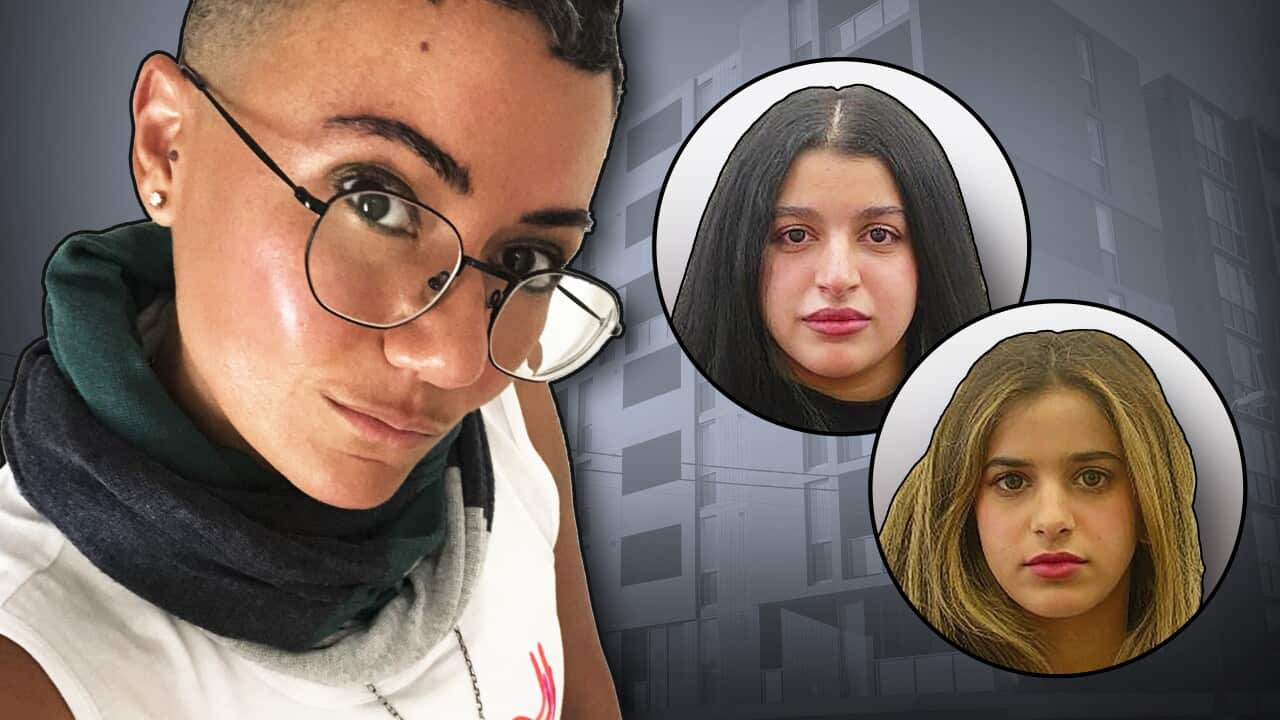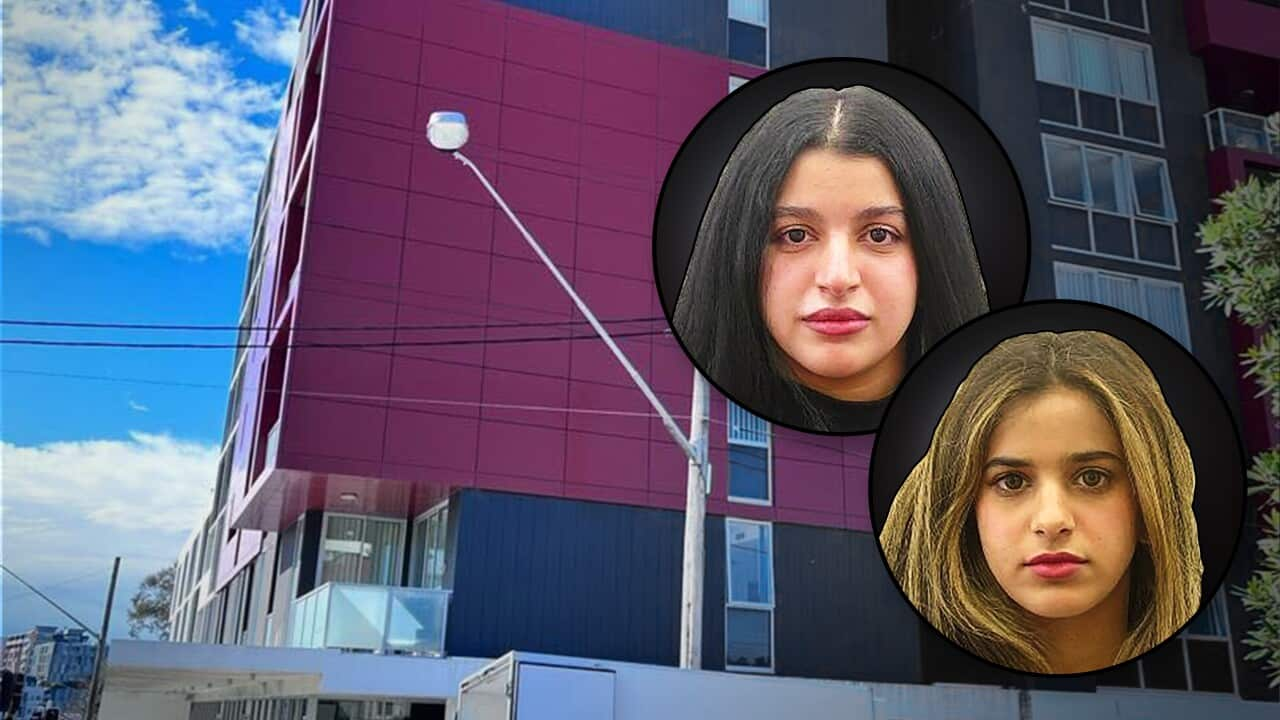Saffaa is like a mother to Sydney’s small community of mostly young asylum seeker women from Saudi Arabia.
The 45-year-old activist, artist, and disability support worker says she has been an unofficial source of help for many such women who have fled their homelands, seeking protection in Australia, in recent years.
The Saudi and Australian citizen (whose artist name is Ms Saffaa) lives in Camperdown, only a 12-minute drive from the Canterbury apartment where , in what local police have called “unusual” circumstances.
Asra Abdullah Alsehli, 24, and her 23-year-old sister Amaal are believed to have been dead for some time before being discovered.
That haunts Saffaa, who said she feels a sense of responsibility towards the two women.

Saffaa, whose artist name is Ms Saffaa, with one of her works, titled ‘I am my own guardian’. Source: Supplied / Saffaa
The assumption “that they had no one they could trust is really distressing for me, because you don’t live in a country or in a city for five years not having one person, one person you can trust,” she said.
“Five years is a long time and enough time to have a community behind you, to have a support system, to have friends, to have people who would worry about you if disappeared for two days. These women disappeared for a month and probably longer.”
If these women were on my radar ... maybe I could have connected them to an organisation or someone who could have helped.- Saffaa, Activist and Artist
Police have previously said the sisters arrived in Australia in 2017. SBS News has confirmed the sisters were seeking asylum in Australia but the reasons for their asylum claim remain unknown. The Department of Home Affairs previously told SBS News it does not comment on individual cases.
Saffaa said she started connecting with “a few Saudi women, asylum seekers and refugees,” a few years ago.
“Most of them are in their 20s and I feel a sense of responsibility towards them. I try to reach out to as many of them as I can with my very limited resources, to connect them to organisations and individuals who can help."
Saffaa said she had seen unsubstantiated claims on Saudi social media alleging the women were part of a network that helped women escape Saudi Arabia.
She said she had tried to contact Burwood Police Station to ask for a community briefing but police were dismissive.
“When the community reached out to the police, they didn’t give us the time of day,” she said.
“When news came out, people in the community asked me to contact the police and [police] weren’t helpful. They were dismissive. I called for days trying to offer the community’s help, but there was no call back. It wasn’t a good experience.”
A spokesperson for NSW Police told SBS News the force "always welcomes the community’s assistance as it continues to investigate the death of the two women, which is why we have appealed for information".
"All information is investigated thoroughly no matter how small, and the NSW Police Force will provide updates as they become available."
Saffaa, said she had spoken with a few members of Sydney’s Saudi community since the sisters' deaths and there is a notable fear among them.
"There is a sense of fear and unsafety, they don't feel safe.”
“The fear is based on the very mysterious and suspicious circumstances the sisters have died.

The apartment block in Canterbury, Sydney, where the sisters were found. Source: SBS News / Essam Al-Ghalib
Saffaa said no one in the community she had spoken with believes the sisters died by suicide.
"I don't think it was suicide. You don't die of suicide in separate rooms with your sister … Wouldn't you want to be, in your final hours and minutes, with your sister in the same room?”
“No one in my community believes it was suicide. It's quite distressing for all of us.”
A worker at the BP petrol station across the street from the sisters’ apartment confirmed previous media reports that the sisters have previously visited and generally avoided conversation.
Saffaa said that may have been due to to their Saudi upbringing. In traditional Saudi culture, women are raised to not overly interact with men who are not their father, brother, or husband.
Australian media has previously reported the sisters seemed “timid” and “scared” when police conducted a welfare check in March at the request of the building managers.
“One thing I’m surprised about is when they do these welfare checks, when you come from a refugee or asylum seeker background, especially from Saudi Arabia, you have a huge mistrust of authority,” Saffaa said.

The petrol station near to the sisters’ apartment. Source: SBS News / Essam Al-Ghalib
“Welfare checks should not be conducted by police or anyone in a uniform.”
“If you have a mistrust of authority, if you’re scared, if there is no one you can trust, and a policeman shows up at your door, you’re not going to open the door.
“Welfare checks should be done by mental health professionals, people who are trauma-informed, someone in the community, someone who knows them.”
Detective Inspector Claudia Allcroft, Crime Manager of Burwood Local Area Command, said last month police had only spoken with two people who knew the women and any piece of information provided by the public could hold the key to solving the investigation.
“The Burwood community is a small and close community, and we hope that someone may be able to assist our investigators,” she said.
NSW Police said in a statement last month: “Despite extensive inquiries, detectives have been unable to ascertain how the women died”.
Anyone who may have information that could assist detectives is urged to contact Burwood Police Station on (02) 9745 8499 or Crime Stoppers on 1800 333 000.
Readers seeking support with mental health can contact Beyond Blue on 1300 22 4636. More information is available at beyondblue.org.au. embracementalhealth.org.au supports people from culturally and linguistically diverse backgrounds.












